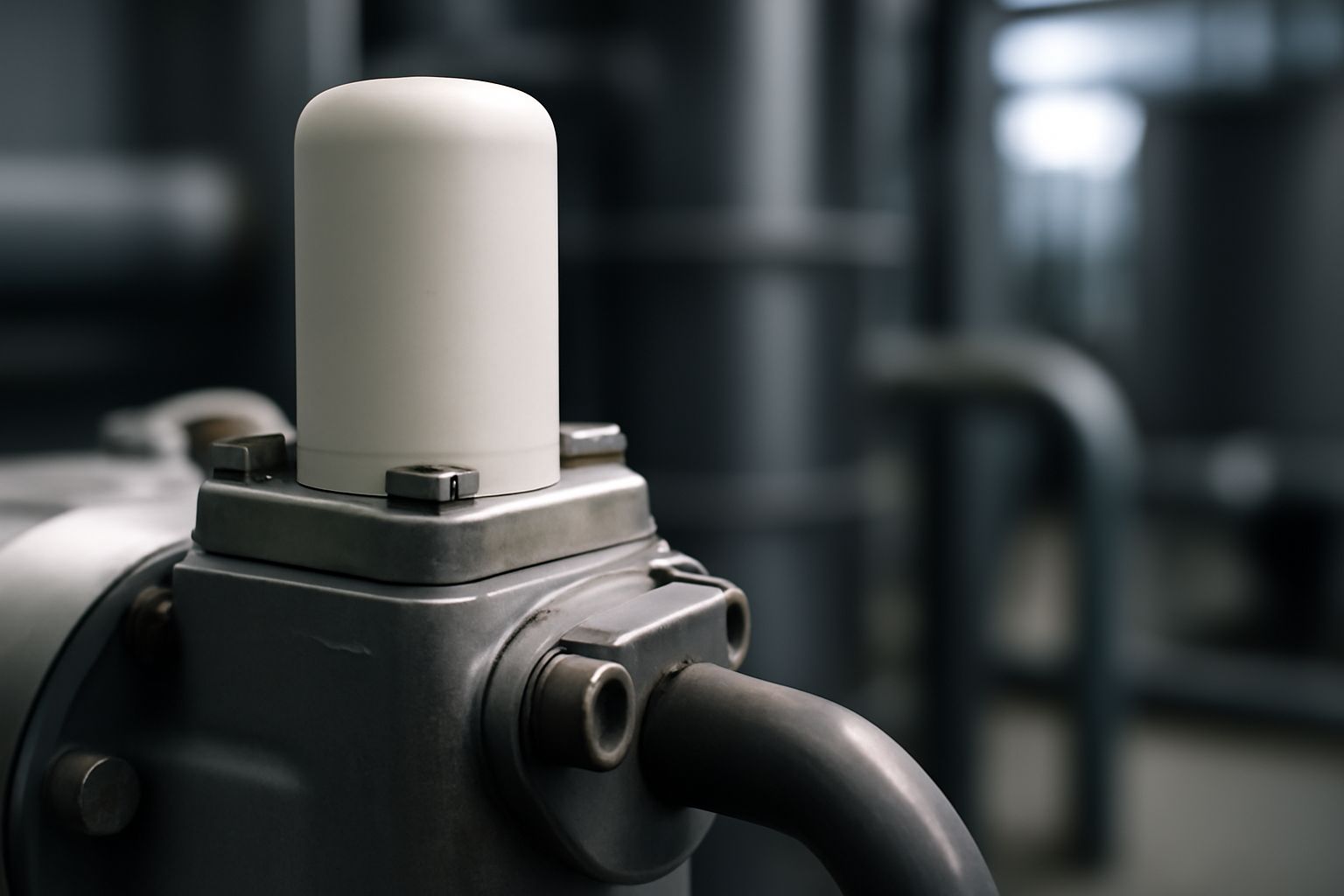تتميز سيراميكات الألومينا بعمر افتراضي أطول من المعادن بثلاثة أضعاف إلى عشرة أضعاف، مما يقلل بشكل كبير من الأعطال ووقت التوقف عن العمل في التطبيقات الصناعية القاسية. كما أن متانتها الفائقة تُقلل بشكل مباشر من تكرار الصيانة وتكلفة الملكية الإجمالية.

لماذا تعتبر أجزاء الألومينا متفوقة على المعادن في البيئات الحرجة؟
في البيئات الصناعية الصعبة، يتفوق سيراميك الألومينا على السبائك المعدنية بفضل صلابته الشديدة ونقائه العالي ومقاومته للتآكل والتآكل. مقارنةً بالفولاذ المقاوم للصدأ أو السبائك المقواة، أجزاء **سيراميك الألومينا** الحفاظ على ثبات الأبعاد بعد آلاف الدورات في العمليات الكاشطة أو عالية الحرارة أو التآكلية. يُمكّن هذا الأداء القوي مديري المشتريات من تقليل أعطال المكونات، خاصةً عندما تتآكل الأجزاء المعدنية أو تتفاعل مع وسائط المعالجة.
قام فريقي بتزويد أنابيب وبطانات الألومينا للمعدات الكيميائية، لتحل محل فولاذ 316L، مما أتاح خدمة متواصلة لأكثر من 18 شهرًا دون أي تدهور ملحوظ، وهو إنجاز لا تُضاهيه المعادن. أظهرت الاختبارات المستقلة التفصيلية، كما هو موضح في ويكيبيديا عن الألومينا ، تأكيدها المعلقة الخمول الكيميائي وموثوقية حرارية طويلة الأمد. هذه الخصائص الفريدة تناسب قطاعات مثل مناولة السوائل، وإنتاج الإلكترونيات، وأجهزة المختبرات.
| ملكية | سيراميك الألومينا | سبيكة معدنية (316L SS) |
|---|---|---|
| الصلابة (فيكرز، HV) | 1500–2000 | 180–250 |
| أقصى درجة حرارة للاستخدام المستمر (°م) | حتى 1600 | 600 |
| المقاومة الكيميائية | ممتاز (الأحماض والقلويات) | من معتدل إلى جيد |
| معدل التآكل (مجم/1000 دورة في الدقيقة، ASTM G65) | 0.2–0.5 | 3–8 |
ما هي مكاسب دورة الحياة التي يحققها المشترون باستخدام السيراميك عالي الأداء؟
يتمتع المشترون الذين يستخدمون مكونات **الألومينا عالية النقاء** بعمر تشغيلي أطول بشكل ملحوظ. عادةً ما تدوم السيراميكات المتطورة لفترة أطول من المعادن بمقدار 5-10 مرات في أختام المضخات، وأنابيب الأفران، والعوازل الكهربائية، مما يقلل من عمليات الاستبدال غير المخطط لها ويزيد من مدة تشغيل المعدات. على سبيل المثال، أدى التحول إلى الألومينا في خط معالجة السوائل الأوروبي إلى مضاعفة العمر التشغيلي من 9 إلى 20 شهرًا دون استبدال.
بفضل هذه المتانة، يحقق مشتري التكنولوجيا المتقدمة وفورات في ثلاثة جوانب مباشرة: انخفاض مخزون قطع الغيار، وتكاليف أقل في تغيير القطع، وتقليل انقطاعات جداول الإنتاج. وفقًا لـ مراجعة AZoM لمتانة السيراميك تعد الموثوقية التشغيلية أحد المحركات الرئيسية لتكلفة الملكية الإجمالية في الصناعات الثقيلة.
| جزء المعدات | متوسط عمر القطعة المعدنية (أشهر) | متوسط عمر جزء الألومينا (أشهر) | كسب وقت التشغيل (%) |
|---|---|---|---|
| غلاف عمود المضخة | 10 | 45 | +350% |
| أنبوب الفرن | 6 | 30 | +400% |
| عازل كهربائي | 30 | 120 | +300% |
هل يمكن أن يؤدي التحول إلى الألومينا إلى خفض تكاليف الصيانة؟
بالتأكيد - يُوفر استخدام سيراميك الألومينا لفرق المشتريات والصيانة تخفيضات ملحوظة في التكاليف. بفضل مقاومتها للتآكل والتأثيرات الكيميائية، نادرًا ما تتطلب قطع الألومينا استبدالات مفاجئة أو إصلاحات غير مخطط لها. ومن النتائج الشائعة: يُقلل التحول من البطانات المعدنية إلى الألومينا متوسط دورات تغيير القطع السنوية من ست دورات إلى دورة واحدة، مما يوفر تكاليف المواد والعمالة.
يؤكد مشترونا الصناعيون أن تكاليف الصيانة تنخفض بنسبة 40-70% على مدى ثلاث سنوات قياسية باستخدام حلول السيراميك عالية الدقة. وتؤدي هذه النتيجة إلى تقليل توقف خطوط الإنتاج، وتقليل التدخل اليدوي، وانخفاض مخاطر التوقف المكلف - وهي حجة حاسمة لخفض التكلفة الإجمالية للملكية في أساطيل المعدات.
| مقياس الصيانة | المعادن التقليدية | سيراميك الألومينا | المدخرات النموذجية لمدة 3 سنوات |
|---|---|---|---|
| فعاليات الاستبدال السنوية | 5–7 | 1-2 | 40-70% |
| إنفاق ساعات العمل (سنويًا) | 50–75 | 12–20 | حتى 60% |
| الطلب على المخزون الاحتياطي | عالية (4-8 مجموعات) | منخفضة (1-2 مجموعات) | 60-80% |
ما هي دراسات الحالة التي تثبت عائد الاستثمار في شركة سيراميك الألومينا؟
تُثبت النتائج الواقعية من مُصنّعي المعدات أن ارتفاع سعر الألومينا الأولي يُعوّضه استرداد سريع للتكاليف التشغيلية. على سبيل المثال، في مارس 2024، قامت شركة ألمانية مُصنّعة للمضخات الدقيقة (إندريس+هاوزر، انظر تفاصيل القضية ) تم تطويرها من بطانات الفولاذ المقاوم للصدأ إلى بطانات 99.7% ألومينا من CSCERAMIC. النتيجة: تم تمديد فترة الاستبدال من 10 إلى 60 شهرًا، وانخفاض تكلفة الصيانة السنوية بمقدار 9,500 يورو، وتم التخلص من أعطال العمليات غير المتوقعة خلال تجربة استمرت 20,000 ساعة.
مثال آخر: شركة أمريكية متخصصة في الأجهزة التحليلية (تقرير ثيرمو فيشر للربع الأول من عام ٢٠٢٤) تحولت إلى استخدام أكسيد الألومنيوم عالي النقاء لأنابيب الأفران عالية الحرارة. قبل هذا التحول، كان معدل فشل الأنابيب يُجبر على تغييرها شهريًا؛ وبعد التحديث، امتدت فترة التغيير إلى ١٨ شهرًا دون أي عيوب، مما وفر ٣٢ ألف دولار أمريكي لكل خط إنتاج سنويًا.
| شركة | طلب | سائق عائد الاستثمار | فائدة تم التحقق منها |
|---|---|---|---|
| إندريس+هاوزر | بطانات المضخة (كيميائية) | تشغيل ممتد، صيانة مقطوعة | 9,500 يورو/سنة، بدون أعطال (20,000 ساعة) |
| ثيرمو فيشر | أنابيب الفرن | توقفات أقل في الخطوط، وعمر أطول للأنبوب | تم توفير 32000 دولار أمريكي/خط/سنة |
تُمكّن سيراميكات الألومينا المشترين من إطالة عمر المعدات وخفض التكاليف بشكل ملحوظ على مدى سنوات. وبفضل سجلها الحافل في أساطيل مُصنّعي المعدات الأصلية (OEM) العالمية، يُحقق هذا الاستثمار عائدًا استثماريًا موثوقًا في جميع القطاعات الحيوية.
راسلنا عبر البريد الإلكتروني صفحة الاتصال




 info@csceramic.com
info@csceramic.com







 +86 18273288522
+86 18273288522